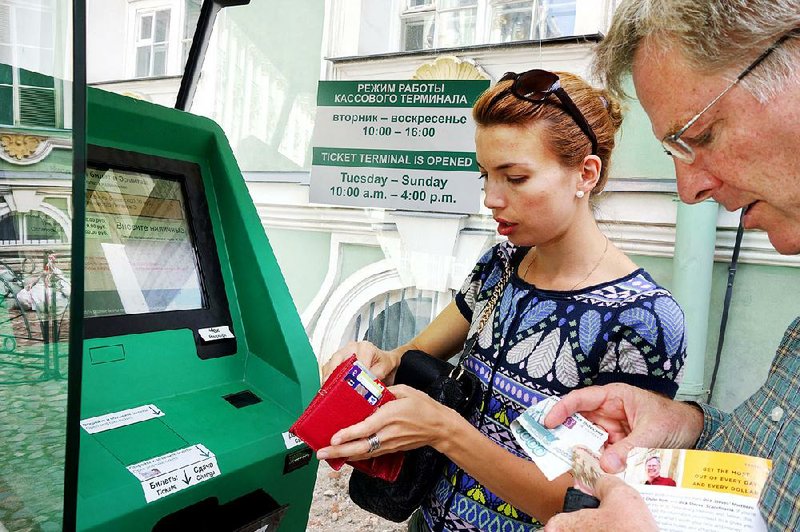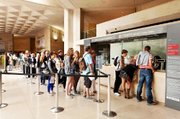Crowds are becoming an increasing nuisance at top European attractions. There’s almost no way to experience places like the Sistine Chapel or the Palace of Versailles without a constant and raging commotion of tourists. It’s not uncommon to find hour-or-more waits in ticket-buying lines and rooms packed shoulder-to-shoulder with visitors and intercontinental body odor. So it’s up to smart tourists to do whatever is possible to minimize hassles and maximize their experience.
Long ticket lines overwhelm Europe’s biggest sights. It always amazes me how the vast majority of people just line up, wasting literally hours to get in. With a little advance planning, you can waltz right in. For instance, at the Vatican Museums (home of the Sistine Chapel), you’ll see a long, long line snaking around the towering fortified walls of Vatican City, where people wait for up to two hours to buy tickets.
However, there and at most big sights, you can bypass lines by reserving an entry time in advance on their websites. If your time is worth anything (and I always assume travelers have very valuable time), you should try to get advance reservations for any must-see sight that offers them — the Eiffel Tower, Neuschwanstein Castle in Bavaria, Anne Frank’s house in Amsterdam, Barcelona’s Picasso Museum and so on. Be warned: Slots can fill up well in advance, especially in peak season, so buy tickets as early as possible.
If you miss out on advance tickets, there’s usually a creative (or pricey) way to avoid lines. At the Vatican Museums, booking a guided tour gets you right in (this works at other places too, such as Versailles or Rome’s Colosseum). In Florence, an expensive but worthwhile sightseeing pass called the Firenze Card lets visitors bypass long lines at sights like the Uffizi Gallery (best collection of Italian paintings in the world) and the Accademia (Michelangelo’s David). A similar pass in Paris lets you skip the ticket lines at the Louvre and Musee d’Orsay, but does not cover the Eiffel Tower, where, if you’re willing to climb the stairs, you can reduce your wait times.
Self-service ticket kiosks, like ones at the Louvre, Versailles and Madrid’s Prado, are becoming common — and can provide a faster way in. In St. Petersburg, I learned that you can avoid ticket lines at the Hermitage museum by buying your tickets at the machines in the courtyard. With up to 10,000 cruise travelers a day flooding into the city — and the Hermitage the top sight on their lists — this place can be a zoo. But with my machine-bought ticket, I walked right by the ticket line and within minutes was enjoying the Leonardos, Rembrandts and Matisses while imagining the ostentatious lifestyles of the czars who collected them.
For some sights, it’s possible to buy tickets elsewhere (sometimes with a small booking fee). Same-day tickets to the Vatican Museums are often available at the tourist information office in St. Peter’s Square, or at the office of tour company Opera Romana Pellegrinaggi. In Venice, tickets to the line-ridden Doge’s Palace also include entry to the never busy Correr Museum, where it’s much faster to buy a ticket. In Athens, entry to the Acropolis is covered by a combo-ticket that you can pick up at other, less-crowded sights, such as the Ancient Agora or Roman Forum.
Timing is important. Each sight tends to have certain days or hours when crowds are worst. In general, sights tend to be packed on weekends and free-entry days. Besides the weekend, Versailles and the d’Orsay are packed on Tuesdays because the Louvre is closed. The Vatican Museums are mobbed on most mornings — except on Wednesdays, when people pack St. Peter’s Square to attend the papal audience. In general, it’s best to visit a sight first thing in the morning or late in the day — but not always. On my last Acropolis visit, I went around noon — perfect timing, as the cruise-ship crowds, who arrived in the morning, were heading in the opposite direction.
Sometimes an itinerary doesn’t allow for flexibility. At these times, you’ll have to make the most of it. Recently I was forced to lumber through Versailles on one of the most crowded days of the year (a Sunday in July). It was an experience I’ll never forget. A steady crush of visitors shuffled through the hot and muggy one-way route, as if enduring some horrible punishment. But the payoff here is the magnificent Hall of Mirrors. Even with a mossy carpet of tourist heads, sights like these are a thrill to see — and worth every sweaty second.
Email: rick@ricksteves.com

